Mark Caney's Blog, page 9
April 23, 2016
Dolphin displays willingness to help others, researchers say
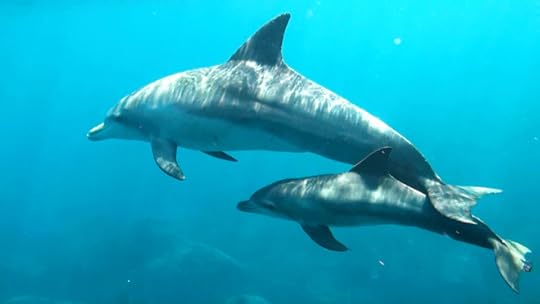
Researchers have confirmed that a wild female dolphin “adopted” a calf whose mother died in an accident, despite having no genetic or social association with the parent.
The adoption behavior was observed for the first time by a research team from Kindai University.
“The finding could shed light on how mutual aid has developed into one in human society,” said Mai Sakai, an instructor of animal behavior at the university.
The findings were published in the British journal Scientific Reports on April 6.
The team first spotted the pair in June 2012 while observing wild Indo-Pacific bottlenose dolphins in waters near Mikurajima island in the Izu island chain located about 230 kilometers south of Tokyo.
They observed an 8-year-old dolphin nursing a calf whose 15-year-old biological mother died after being caught in a fishing net. The female dolphin was found to have raised the calf for about 100 days since their first observation of the pair.
DNA testing on the foster mother revealed that she is not closely related to the biological mother such as sisters. The research team also looked into observation records and discovered that the foster mother and biological mother were “strangers” to one another.
About 120 Indo-Pacific bottlenose dolphins live in waters near Mikurajima.
The latest finding came as a result of research that has been conducted steadily since 1994 on identifying individual dolphins by taking underwater images.
Although there are other mammal adoption cases, including a dog raising an orphaned kitten, those cases usually involved a special situation, such as the animal who became a foster parent was also raising its own offspring at the time of adoption or having lost its own baby, the researchers said.
Source: The Ashai Simbun

April 21, 2016
SeaWorld withdraws plans for orca tank project
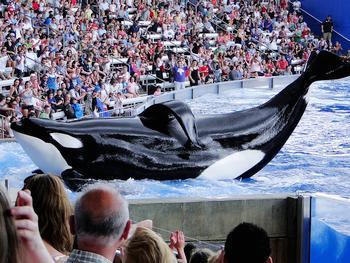 SeaWorld, in a letter to the California Coastal Commission this week, reaffirmed its intent to no longer enlarge the killer whale tanks at its San Diego park.
SeaWorld, in a letter to the California Coastal Commission this week, reaffirmed its intent to no longer enlarge the killer whale tanks at its San Diego park.
Although the commission last year approved a $100 million proposal to double the volume of the orca habitat, it imposed a condition requiring that the theme park end all breeding of its killer whales. SeaWorld subsequently sued the commission, arguing that the agency has no legal authority to take such an action.
With SeaWorld’s announcement last month that it will no longer be breeding orcas at any of its marine parks, the company decided to formally withdraw its application for the tank expansion project, known as Blue World.
“This letter serves as SeaWorld San Diego’s formal withdrawal of coastal development permit Application 6-15-0424 for the Blue World orca habitat expansion,” reads the letter sent Monday to the commission.
Full story: San Diego Union Tribune

April 17, 2016
Dolphins have a language that helps them solve problems together
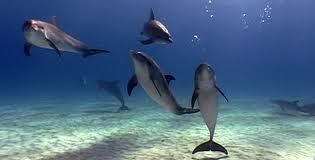 Bottlenose dolphins have been observed chattering while cooperating to solve a tricky puzzle – a feat that suggests they have a type of vocalisation dedicated to cooperating on problem solving.
Bottlenose dolphins have been observed chattering while cooperating to solve a tricky puzzle – a feat that suggests they have a type of vocalisation dedicated to cooperating on problem solving.
Holli Eskelinen of Dolphins Plus research institute in Florida and her colleagues at the University of Southern Mississippi presented a group of six captive dolphins with a locked canister filled with food. The canister could only be opened by simultaneously pulling on a rope at either end.
The team conducted 24 canister trials, during which all six dolphins were present. Only two of the dolphins ever managed to crack the puzzle and get to the food.
The successful pair was prolific, though: in 20 of the trials, the same two adult males worked together to open the food canister in a matter of few minutes. In the other four trials, one of the dolphins managed to solve the problem on its own, but this was much trickier and took longer to execute.
But the real surprise came from recordings of the vocalisations the dolphins made during the experiment. The team found that when the dolphins worked together to open the canister, they made around three times more vocalisations than they did while opening the canister on their own or when there was either no canister present or no interaction with the canister in the pool.
Importantly, the researchers were able to show that the increase in burst pulse chatter was directly related to the canister-opening task as opposed to social interactions between the dolphins.
During the trials when one dolphin opened the canister unaided, one or more of the other dolphins was present nearby, watching the task. On these occasions, there was no increase in burst pulse chatter. The team concluded that the increased chatter during the joint canister opening was related to the task itself, and not to the presence of another dolphin.
“This is the first time that we can say conclusively that dolphin vocalisations were used to solve a cooperative task,” says Eskelinen.
Unlike most dolphin vocalisations, the so-called “burst pulses” the dolphins made are audible to humans as a squawking sound. We already knew that dolphins use burst pulses during social interaction and echolocation. But according to Leigh Torres, a marine ecologist at Oregon State University, these new findings suggest that burst pulses may have another sophisticated purpose.
Full story: New Scientist

April 3, 2016
Dopey Dick, killer whale that swam into Derry in 1977, still alive and well
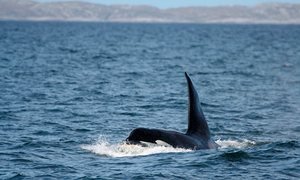
The whale was nicknamed Dopey Dick by locals after he made his way up the river Foyle into the heart of Derry in pursuit of salmon in 1977. He is now thought to be at least 58 and was identified when pictures of the Irish incident were compared with images taken of a pod of whales near the Isle of Skye in September 2014.
Known as Comet, the orca is part of the vulnerable west coast community whales – the UK’s only known resident population of killer whales – that are tracked by experts.
Andy Foote, a killer whale expert, said: “When I saw the photos on Facebook, I noticed that the white eye patch of Dopey Dick sloped backwards in a really distinctive fashion.
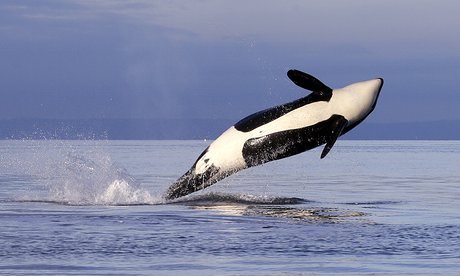
“This is a trait we see in all the west coast community whales, but it’s not that common in other killer whale populations. The photographs were all quite grainy, but it was still possible to see some of the distinctive features unique to Comet.
“I couldn’t believe it – he was already a full-grown male back in 1977, when I was just five years old.”
The Hebridean Whale and Dolphin Trust has been documenting the west coast community’s behaviour since 1994.
The four males and four females are not known to interact with other orca populations in the north-east Atlantic and, since studies began, have never successfully reproduced.
In January this year, one of the females, named Lulu, died after being stranded near Tiree.
The trust said the discovery that Dopey Dick was in fact Comet is significant to understanding the age of the west coast group.
Padraig Whooley, sightings officer of the Irish Whale and Dolphin Group, said: “This match places Comet very much at the upper limits of the typical life expectancy of male killer whales.
“Adult males generally live to around 30 years, but with an upper range of 50 to 60 years.
“So, clearly time is not only running out for this individual whale – it is equally running out for whale biologists, who may not have much time left to gather information on this unique local population of killer whales that have made the waters of the British Isles their home.”
Source: The Guardian

February 29, 2016
Dolphin plays with an octopus
Stunning photographs have captured a dolphin frolicking with an octopus and tossing it into the air with its snout as it swims in the ocean.
In one image, the playful dolphins appears to have the octopus entirely in its mouth, but then flings it into the air, with water droplets flying everywhere.
The photos, taken in Mandurah, a coastal city in Western Australian, are by PHD candidate Krista Nicholson.
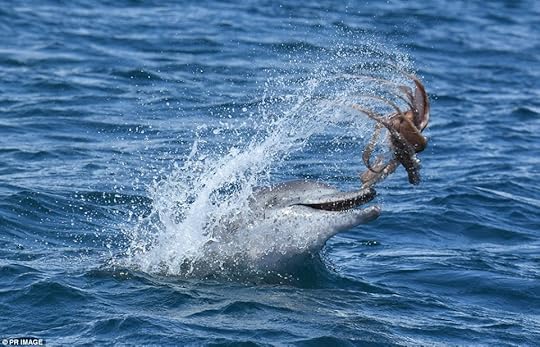
Ms Nicholson is part of Murdoch University’s Cetacean Research Unit (MUCRU).
Ms Nicholson told the Mandurah Coastal Times she had seen dolphins take part in an ‘octopus toss’ before, but it was unusual to get pictures.
‘It’s not unheard of for dolphins to do this, but it’s not a regular occurrence’ she said.
‘We haven’t seen them (Mandurah dolphins) actually consume an octopus.
‘But there are records from other parts of the world of dolphins playing with octopuses.’
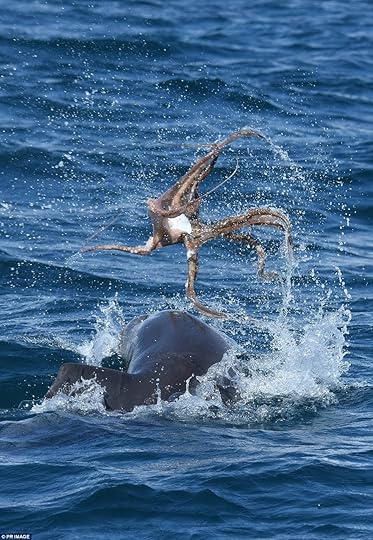
Ms Nicholson is part of the Mandurah Dolphin Research Project, which started in January and is looking at bottlenose dolphins who use the Peel-Harvey and adjacent coastal waters in Western Australia.
The project involves characterising population size and structure, habitat use and genetic connectivity between the dolphins, using the estuarine and coastal areas.
The MUCRU has been studying bottlenose dolphins in the Bunbury and Perth area for almost a decade.
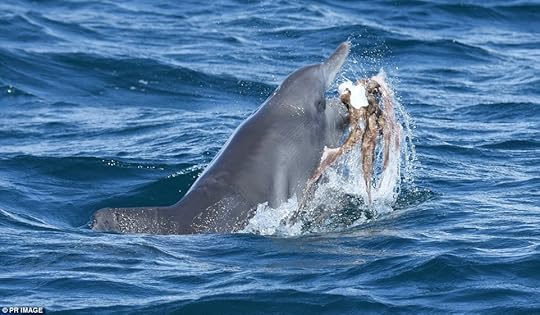
Full story: Daily Mail

February 20, 2016
Rare baby dolphin dies after people pass it around for selfies
A young dolphin has died after beachgoers took it from the sea to pose for photographs with it.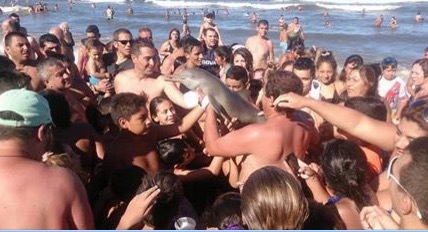
Huge crowds gathered around the small animal on the beach resort at Santa Teresita in Argentina after one man picked it up.
But it appears it quickly overheated and died while out of the water.
It was still being passed around by the beachgoers after its death and was later left discarded in the sand.
The dolphin was from the La Plata – also known as the Franciscana – variety, found off the coasts of Argentina, Uruguay and Brazil.
It is considered a “vulnerable” species because there are only about 30,000 left in the world.
The Argentine Wildlife Foundation later issued a reminder to the public of the mammal’s extreme vulnerability, hoping it will prevent such a sad event again.
“The Franciscana, like other species, cannot remain for much time outside of the water, it has thick fatty skin which gives it heat and means that taking it out of the water rapidly causes it to dehydrate and die,” it said in a statement.
Source: Yahoo news

February 14, 2016
Dolphin in trouble in Chichester Harbour, UK
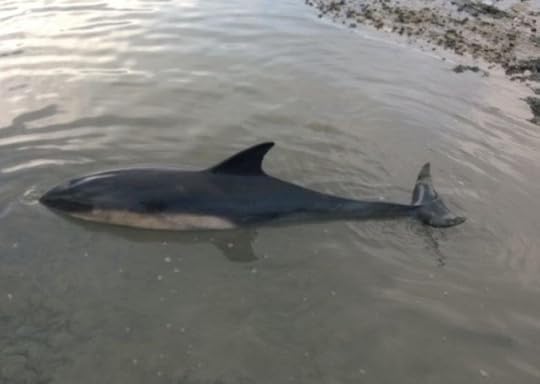 The RSPCA is said to be monitoring the condition of a dolphin which swam into Chichester Harbour this morning.
The RSPCA is said to be monitoring the condition of a dolphin which swam into Chichester Harbour this morning.
The animal was spotted beached on mud in Bosham Hoe earlier today.
Although a rescue team managed to refloat the common dolphin, it is said to be swimming around languidly, forcing the RSPCA to consider whether or not to put the animal down.
Chichester harbour master Richard Craven said: “The dolphin was spotted by someone in Bosham Hoe on the mud earlier this morning (13th February).
Source: The News

February 7, 2016
Japan deports ‘The Cove’ dolphin activist, Ric O’Barry
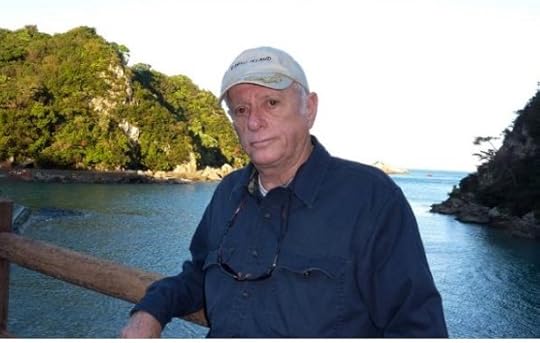 US animal rights activist Ric O’Barry, detained for nearly three weeks after being denied entry to Japan, has been deported from the country, his supporters said Friday.
US animal rights activist Ric O’Barry, detained for nearly three weeks after being denied entry to Japan, has been deported from the country, his supporters said Friday.
The star of the Oscar-winning documentary “The Cove” about dolphin killing in a town of Taiji, “has been placed on an airplane and deported from Japan, where he has been incarcerated for 19 days,” said a statement from Dolphin Project, a conservation group he heads.
O’Barry had been fighting for entry into Japan after immigration authorities refused to let him in last month and he was held at the airport until his departure.
Japanese immigration officials cited his past trip to an area where did not report to authorities when visiting Japan last year on a tourist visa, it said.
“It is ironic that they are deporting me to keep me quiet, when they themselves have brought more attention to the dolphin slaughter than ‘The Cove’ movie,” O’Barry said in the statement.
“It breaks my heart to be deported from a country I have grown to love.”
“The Cove”, which won an Academy Award in 2010, drew worldwide attention to the annual dolphin hunt in the small Japanese town of Taiji.
The 76-year-old O’Barry lost more than 10 kilogrammes (22 pounds) and suffered a minor chest problem during his stay at a “jail-like facility of the Immigration Bureau at Narita Airport, Tokyo,” Dolphin Project lawyer Takashi Takano said in the same statement.
“Mr O’Barry’s visits to ‘The Cove’ in Taiji and his reports on dolphin hunting should be considered a legitimate tourist activity,” Takano said.
“To those who believe Japan is an open and democratic country, it must be shocking to realise this kind of experience can happen here and now.”
Full story: Yahoo

February 3, 2016
Tougher controls on swim-with-dolphin programs proposed in USA
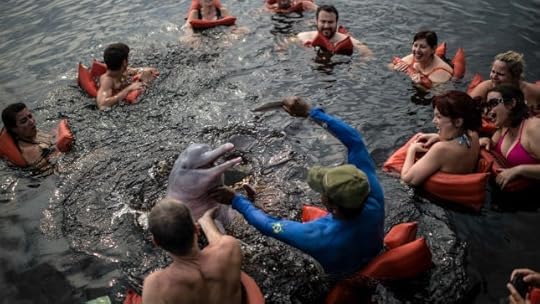
The U.S. Department of Agriculture (USDA)proposed Tuesday new animal welfare regulations for handling dolphins and other marine mammals in captivity. The rules will ensure dolphins are treated well and cared for at aquatic parks, the agency said.
Dolphins would enjoy better water quality and space to roam in captivity under the revived rules, which were previously suspended in the 1990s.
This could have an impact on swim-with-the-dolphin programs, the agency noted.
The public has 60 days to comment.
Source: The Hill

January 20, 2016
Video shows dolphin jumping over paddle boarder in Tampa Bay, USA




